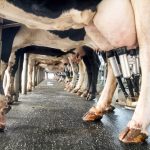1.
Nutrition

Thirst for ‘climate- friendly’ Ecomilk tested
Australian dairy sells milk from cows fed seaweed, which reduces methane production
A small dairy in the Australian state of Tasmania is stocking supermarket shelves with what it says is the world's first branded milk produced by cows fed with a seaweed that makes them emit lower levels of environmentally damaging methane gas.

Strategically feed the robot
Feeding more in the milking robot doesn’t mean more visits by cows
Feeding cows that are milked with a robot is more complicated than you think. It is not enough to add feed to the robot. It is necessary to ensure that […] Read more

Good early-lactation nutrition cuts risk of cystic ovaries
A drop in proper metabolic function will pose reproductive challenges in cows
Glacier FarmMedia – Most producers usually wait until estrus appears in a dairy cow at 60-70 days postpartum, then place an emphasis on getting her pregnant by 90 days. This […] Read more

Trouw targets dry matter accuracy of dairy feeding with new app
DNA Connect allows for adjustments through smartphone or tablet
Accurately tracking dry matter intake is critical for dairy farmers, and a new app from Trouw Nutrition aims to make that easier and more efficient. One of the app’s early […] Read more

Dairy management changes may offer answers to butterfat equation
With feed additive, analyze the numbers to see if it pays
Enhancing ventilation may be one of the most cost-effective ways to increase butterfat content in a herd’s milk over the long term instead of using feed additives, according to two […] Read more

First-of-its-kind cattle methane limiter approved for Canada
Enteric methane emissions from cattle contributes 3.3 per cent of Canada’s total GHG emissions
A feed ingredient designed to reduce methane emissions in beef and dairy cattle has received market authorization in Canada.

Canola meal shows benefits for milk production, lower emissions
New study reviewed 20 years of nutrition research
A new review in the journal Advances in Dairy Research indicates canola meal provides numerous dairy ration benefits. The international journal review examined 20 years of canola meal studies in […] Read more

Many factors affect milk frothing problem
Lactation length, milking frequency, prechilling and filter replacement all contribute to higher free fatty acids
A frothy problem identified by Starbucks baristas in British Columbia does not have a simple solution. Elevated levels of free fatty acids in milk can result in cheese coagulation issues, […] Read more

Monitoring dairy cows’ water use has benefits
Maximizing water use efficiency should be a priority, says AAFC researcher
Small changes can pay big dividends in water use on dairy farms, both financially and in preserving water quality and supply. Determining where to make those changes often takes careful […] Read more

Reducing dairy methane starts with feed
AAFC researcher reviews what farmers can do to mitigate methane
Feeding strategies can play an important role in helping dairy farmers in Canada achieve the goal of becoming carbon neutral by 2050, a target set by the Dairy Farmers of […] Read more
